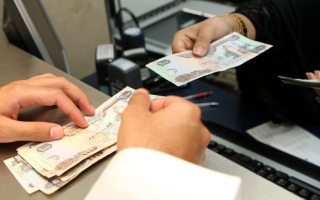- City Fajr Shuruq Duhr Asr Magrib Isha
- Dubai 04:26 05:44 12:20 15:47 18:50 20:08
Call it the UAE resident’s debt wish. How else can you explain that, on average, everyone living here in the UAE – man, woman, child – owes more than Dh55,000 to the banks in personal debt?
Official statistics published on Monday by the UAE Central Bank show that, as of June 2012, UAE residents owe Dh422 billion on their mortgages and personal loans, more than triple since 2006.
With an estimated population of 7.6 million and an average household size of 6.3, that works out to Dh350,000 of debt that each one of the UAE’s households is saddled with.
This record debt, which includes personal loans for business purposes, is up by more than 205 per cent in less than six years, from Dh138.2bn recorded in December 2006.
Bank credit to UAE residents, in fact, crossed the Dh1 trillion-threshold for the first time ever in February this year, and stands at an all-time high of Dh1.02 trillion as of June 2012.
Real estate loans, or mortgages, have seen the most increase in the five-and-a-half-year period, rising by more than 475 per cent, or almost six times, from Dh28.28bn in December 2006 to Dh161.53bn in June 2012.
In fact, after the property price bust in 2009, mortgages have slowed down remarkably and, after declining by about 1 per cent in 2011, property loans have only recently started rising once again, with latest data showing an annualised increase of 1.4 per cent in 2012, which should take the total amount of debt in mortgages by the end of 2012 back to 2010 levels.
On the other hand, personal loans for consumption purposes have jumped more than two-and-a-half times (an increase of 171 per cent), from Dh28.82bn in December 2006 to 78.25bn in June 2012. In fact, personal loans for consumption have seen the fastest rise in the last six months among personal debt categories, rising by 13.17 per cent – or an annualised rate of 26.34 per cent – from Dh69.14bn at the end of 2011.
At Dh180.96bn in June 2012, personal loans for business purposes is in fact 1 per cent lower than what it was in December 2011 (Dh182.95bn), but has more than doubled from Dh81.13bn in December 2006.
But does higher household debt necessarily amplify downturns and weaken economic recovery? A recent report by the International Monetary Fund, based on an analysis of advanced economies over the past three decades, found that housing busts and recessions preceded by larger run-ups in household debt tend to be more severe and protracted.
“Household debt soared in the years leading up to the Great Recession.
In advanced economies, during the five years preceding 2007, the ratio of household debt to income rose by an average of 39 percentage points, to 138 per cent,” the IMF’s World Economic Outlook (April 2012) said in the chapter titled ‘Dealing With Household Debt’.
“Based on case studies, we find that government policies can help prevent prolonged contractions in economic activity by addressing the problem of excessive household debt,” it noted.
However, the IMF report acknowledged that there are no conclusive reports on whether or not a higher level of household debt negatively impacts a country’s economic performance. “Overall, there is no accepted wisdom about whether and how gross debt may restrain economic activity,” it said.
MUST READ
UAE set for salary hikes in 2013?
 Dubai 18+ students: How to get temp work permit
Dubai 18+ students: How to get temp work permit
![]() Follow Emirates 24|7 on Google News.
Follow Emirates 24|7 on Google News.